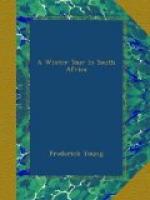CLIMATE. 109-112
THE NATIVE QUESTION. 113-116
RAILWAYS. 117-122
COLONISATION. 123-127
THE POLITICAL SITUATION. 128-148
Appendix:—
I. Discussion on a Paper entitled
“A Winter Tour in South
Africa,” by Sir Frederick
Young, at the Royal Colonial
Institute
149-163
II. Lecture on Imperial Federation delivered at Cape Town 164-173
[Illustration: Decorative]
The voyage.
On the 3rd of May last, I left Southampton in the s.s. Spartan for Cape Town. This three weeks’ ocean voyage has become one of the most enjoyable it is possible to take by those who are seeking health or pleasure on the sea. The steamers of the great companies, which carry on so admirably the weekly communication between England and South Africa, are so powerful, handsome, and commodious, their captains and crews are so attentive and obliging, their food and cabin accommodation so ample and luxurious, that it seems impossible for anyone, excepting a confirmed grumbler, to find any reasonable fault with any of their arrangements, where all are so good. Passengers will select the particular vessel by which they desire to travel, rather by the convenience of the date fixed for sailing, than from any particular choice of the name of the steamer, either belonging to the Castle Mail Packet Company, the Union Steamship Company, or any other line.
A sea voyage of the kind I have recently taken does not give opportunity for much striking incident, or exciting variety. If restful and pleasant to those who are escaping for a while from the bustle and turmoil of life on shore, it is at all events bound to be somewhat monotonous, in spite of the many amusements which are daily arranged, including cricket, tennis, quoits, concerts, dances, etc., of which I experienced a fair share. On many occasions I was called upon to preside at concerts, lectures, etc., not only amongst the saloon passengers, but also in the third class cabin. A rough voyage across the Bay of Biscay, a view of the Tagus, a brief run on shore to look at the picturesque capital of Portugal, a gaze at the spot, which marks the memory of the scene of the fearful earthquake of 1755, which destroyed most of the town, and 50,000 of its inhabitants; a short stay at the lovely island of Madeira, sufficient to glance at its beautiful scenery, to breathe its balmy air, to taste its delicious fruits, and to land




